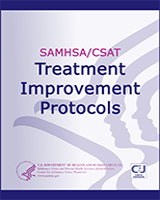NCBI Bookshelf. A service of the National Library of Medicine, National Institutes of Health.
This TIP, Substance Abuse: Clinical Issues in Intensive Outpatient Treatment, was written to help clinicians address the expansion of intensive outpatient treatment (IOT) represented by the development and adoption of new approaches to treat a wider variety of clients. Researchers and clinicians have begun to question the acute care model of treatment for substance use disorders; this reexamination has led to a more robust collaboration between researchers and practitioners. The resulting focus on evidence-based treatment approaches informs most of the material in this TIP. The consensus panel presents 14 guiding principles of IOT, supported by research and clinical experience. This TIP also situates IOT within the continuum of care framework established by the American Society of Addiction Medicine, including outpatient treatment and continuing community care. The volume describes the core services every program should offer, the enhanced services that should be available on site or through links with community-based services, and the process of assessment, placement, and treatment planning that helps clinicians address each client's needs. Based on research and clinical experience, the consensus panel discusses major clinical challenges of IOT and surveys the most common treatment approaches used in IOT programs, including family-based services. More specialized sections address treatment of specific groups of clients: women; adolescents and young adults; persons involved with the criminal justice system; individuals with co-occurring disorders; racial and ethnic minorities; persons with HIV/AIDS; lesbian, gay, and bisexual individuals; persons with physical or cognitive disabilities; rural populations; individuals who are homeless; and older adults.
Contents
- Acknowledgments
- What Is a TIP?
- Consensus Panel
- Foreword
- Executive Summary
- Chapter 1. Introduction
- Chapter 2. Principles of Intensive Outpatient Treatment
- Principle 1: Make Treatment Readily Available
- Principle 2: Ease Entry
- Principle 3: Build on Existing Motivation
- Principle 4: Enhance Therapeutic Alliance
- Principle 5: Make Retention a Priority
- Principle 6: Assess and Address Individual Treatment Needs
- Principle 7: Provide Ongoing Care
- Principle 8: Monitor Abstinence
- Principle 9: Use Mutual-Help and Other Community-Based Supports
- Principle 10: Use Medications if Indicated
- Principle 11: Educate About Substance Use Disorders, Recovery, and Relapse
- Principle 12: Engage Families, Employers, and Significant Others
- Principle 13: Incorporate Evidence-Based Approaches
- Principle 14: Improve Program Administration
- Chapter 3. Intensive Outpatient Treatment and the Continuum of Care
- Chapter 4. Services in Intensive Outpatient Treatment Programs
- Chapter 5. Treatment Entry and Engagement
- Elements of Engaging the Client in IOT
- Collect Screening Information
- Assessing Barriers to Treatment
- Crises and Emergencies
- Components of the IOT Admission Process
- Sample Treatment Plans
- Appendix 5-A. Substance Use History Form
- Appendix 5-B. Instruments for Determining Substance-Related and Psychiatric Diagnoses
- Appendix 5-C. DSM-IV Criteria for Substance Dependence and Substance Abuse
- Appendix 5-D. Supplements to the Six Assessment Domains in the ASI and Other Topics
- Chapter 6. Family-Based Services
- Chapter 7. Clinical Issues, Challenges, and Strategies in Intensive Outpatient Treatment
- Chapter 8. Intensive Outpatient Treatment Approaches
- Chapter 9. Adapting Intensive Outpatient Treatment for Specific Populations
- Chapter 10. Addressing Diverse Populations in Intensive Outpatient Treatment
- Appendix A. Bibliography
- Appendix B. Urine Collection and Testing Procedures and Alternative Methods for Monitoring Drug Use
- Appendix C. Resource Panel
- Appendix D. Cultural Competency and Diversity Network Participants
- Appendix E. Field Reviewers
This publication was produced by JBS International, Inc. (JBS), under the Knowledge Application Program (KAP) contract numbers 270-99-7072 and 270-04-7049 with the Substance Abuse and Mental Health Services Administration (SAMHSA), U.S. Department of Health and Human Services (DHHS).
Suggested citation:
Center for Substance Abuse Treatment. Substance Abuse: Clinical Issues in Intensive Outpatient Treatment. Treatment Improvement Protocol (TIP) Series 47. DHHS Publication No. (SMA) 06-4182. Rockville, MD: Substance Abuse and Mental Health Services Administration, 2006.
The opinions expressed herein are the views of the consensus panel members and do not necessarily reflect the official position of CSAT, SAMHSA, or DHHS. No official support of or endorsement by CSAT, SAMHSA, or DHHS for these opinions or for particular instruments, software, or resources described in this document is intended or should be inferred. The guidelines in this document should not be considered substitutes for individualized client care and treatment decisions.
- NLM CatalogRelated NLM Catalog Entries
- Review Disparities Within Serious Mental Illness[ 2016]Review Disparities Within Serious Mental IllnessEvans TS, Berkman N, Brown C, Gaynes B, Weber RP. 2016 May
- Review Intensive Outpatient Treatment for Alcohol and Other Drug Abuse[ 1994]Review Intensive Outpatient Treatment for Alcohol and Other Drug AbuseCenter for Substance Abuse Treatment. 1994
- Adolescent Pregnancy Guidelines.[J Obstet Gynaecol Can. 2015]Adolescent Pregnancy Guidelines.Fleming N, O'Driscoll T, Becker G, Spitzer RF, CANPAGO COMMITTEE. J Obstet Gynaecol Can. 2015 Aug; 37(8):740-756.
- [Integrated treatment for severe mental illness and substance abuse: Effective components of programs for persons with co-occurring disorders.].[Sante Ment Que. 2001][Integrated treatment for severe mental illness and substance abuse: Effective components of programs for persons with co-occurring disorders.].Mueser KT, Noordsy DL, Drake RE, Fox L. Sante Ment Que. 2001; 26(2):22-46.
- Review Improving Cultural Competence to Reduce Health Disparities[ 2016]Review Improving Cultural Competence to Reduce Health DisparitiesButler M, McCreedy E, Schwer N, Burgess D, Call K, Przedworski J, Rosser S, Larson S, Allen M, Fu S, et al. 2016 Mar
- Substance Abuse: Clinical Issues in Intensive Outpatient TreatmentSubstance Abuse: Clinical Issues in Intensive Outpatient Treatment
Your browsing activity is empty.
Activity recording is turned off.
See more...
